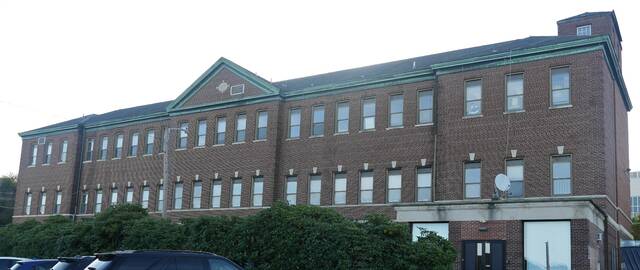
The entrance to Luzerne County’s first walk-in mental health crisis and stabilization center is along East Broad Street in Hazleton near the city’s downtown area. County council earmarked $800,000 in federal American Rescue Plan Act funding for the project.
Jennifer Learn-Andes | Times Leader
Luzerne County’s first walk-in mental health crisis and stabilization center is near completion in Hazleton, but it cannot be finished and open until an overdue state budget is adopted, according to Tara Fox, county Mental Health/Developmental Services administrator.
County officials had initiated the publicly funded center as part of a statewide push to address mental health crises through walk-in and mobile services instead of overburdened hospital emergency rooms, she said. The center will provide continuous observation and supervision for those in distress when in-patient admission is not warranted.
The crisis center will be operated by the nonprofit Northeast Counseling Services in its property at 750 E. Broad St. near the Lehigh Valley Hospital.
County council allocated $800,000 in federal American Rescue Plan Act funds to cover the lion’s share of costs to renovate a portion of the Hazleton building for the crisis center.
Fox said approximately 40 days of construction work must be completed for the center to open, but the county was forced to halt the project in early September because a portion of the county’s state mental health funding is needed to pay the remaining costs.
County officials have been highlighting fiscal challenges caused by the state budget stalemate since August, particularly impacts on county human service agencies. Passage of a state budget is now three months overdue.
County council approved a resolution Sept. 9 describing the state budget impasse as “irresponsible and detrimental to the welfare of county taxpayers.”
Council’s resolution urges the state legislature and governor to “prioritize their responsibilities and work collaboratively to finalize a budget without further delay.”
County Manager Romilda Crocamo said the hands-on crisis center in Hazleton “represents a crucial advancement in mental health services” for southern county residents.
“By providing essential services closer to home, we can directly address the mental health needs of our community, offering timely support and intervention when it is needed most,” Crocamo said.
The ongoing budget stalemate in Harrisburg has “delayed the delivery of these vital services” and also increases financial pressure on the county as it continues to wrestle with its own rising costs, including expenses for courts and the prison, Crocamo said.
State funding delays have forced the county to cover expenses totaling $850,000 to $900,000 per month for Children, Youth and Families staff and adoption/foster subsidies, said county Budget/Finance Division Head Mary Roselle.
“Each day that passes without the necessary funding further exacerbates the challenges we face,” Crocamo said. “The longer we wait, the more pronounced the consequences become.”
When the crisis center opens, those struggling with anxiety, depression or any other mental health issues will be encouraged to obtain assistance, Fox said.
Actual services will be contracted separately and covered by private insurance, Medicare, managed care, and human services block grant funding, Fox said.
“Hospital emergency rooms are not necessarily designed to be mental health crisis providers. They’re there for medical emergencies,” Fox said.
The crisis center will have a “more relaxed and open setting” than an emergency room, with recliners and other patient seating instead of hospital beds, she said.
“It will be a comfortable atmosphere to help them through a crisis event,” she said.
Northeast Counseling will provide therapists. A psychiatrist will be available much of the time, supplemented by virtual consulting psychiatric services as needed, she said.
Certified peer specialists also will be on staff to offer support services. These specialists are credentialed to use their own personal experience to serve as role models and advocates to show how someone can lead a productive life while managing mental health challenges.
An advertising campaign and media alerts will be activated to announce the opening when a date is set, she said.
Northeast Counseling already has been meeting with other providers and hospitals to “spread the word,” she said.
Hazleton Mayor Jeff Cusat said the crisis center will be a positive addition for residents in need.
Some assistance resources are located in Wilkes-Barre, the county seat, prompting those in need to complain they are unable to access them due to the distance, he said. In this case, the initiative is in the southern half, he said.
“It will be nice to have a local place to help people immediately,” Cusat said.
Initially, the plan was to have a second center in Wilkes-Barre. The Northeast Behavioral Health Care Consortium had earmarked $4 million in Managed Care Reinvestment Funds to the nonprofit Family Service Association of Northeastern Pennsylvania to ready a site to house a crisis center and operate it. Potential sites were explored in the summer of 2024.
However, Fox said the nonprofit opted not to proceed with the project following a leadership change. As a result, the funding allocation was withdrawn. A state grant subsequently became available. The county collaborated with Wyoming Valley Behavioral Health and the Wright Center to submit a joint proposal to proceed with the project, but the county’s submission was not selected in the highly competitive application process, Fox said.
Fox said she is not giving up on the possibility of a second center in the county’s northern half and believes the plan will eventually come to fruition based on successful outcomes at the Hazleton center.
Reach Jennifer Learn-Andes at 570-991-6388 or on Twitter @TLJenLearnAndes.





